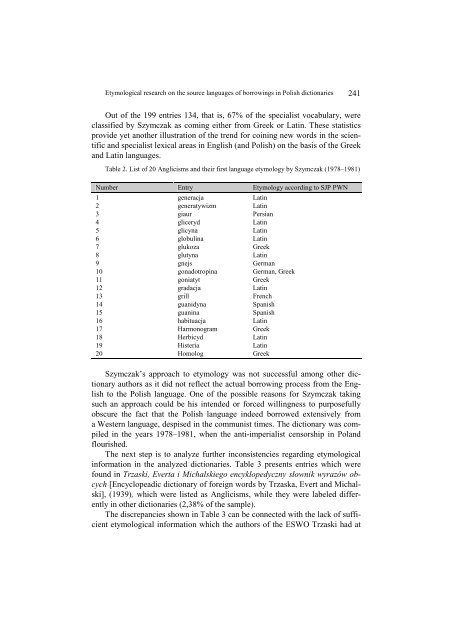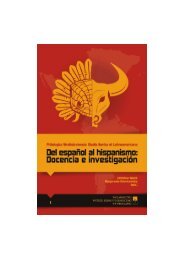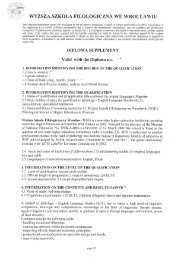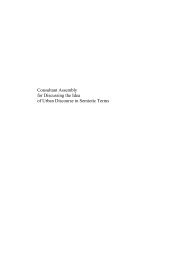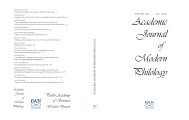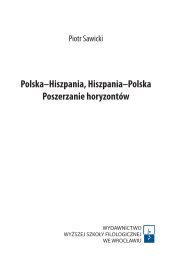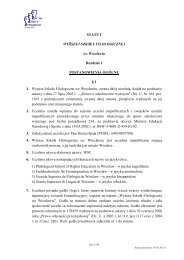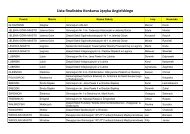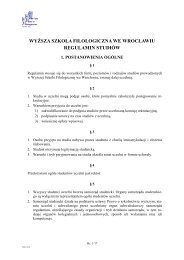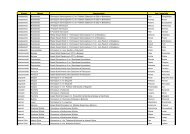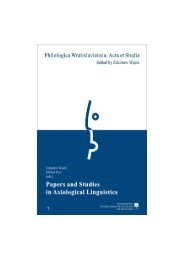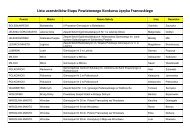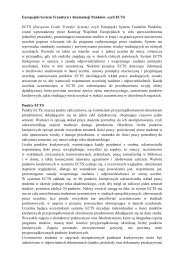- Page 3 and 4:
Languages in Contact 2011
- Page 5 and 6:
Zdzisław Wąsik Piotr P. Chruszcze
- Page 7 and 8:
Table of contents ELŻBIETA ADAMCZY
- Page 9 and 10:
ELŻBIETA ADAMCZYK ADAM MICKIEWICZ
- Page 11 and 12:
On the fate of the s-stems in West
- Page 13 and 14:
On the fate of the s-stems in West
- Page 15 and 16:
On the fate of the s-stems in West
- Page 17 and 18:
On the fate of the s-stems in West
- Page 19 and 20:
On the fate of the s-stems in West
- Page 21 and 22:
On the fate of the s-stems in West
- Page 23 and 24:
On the fate of the s-stems in West
- Page 25 and 26:
On the fate of the s-stems in West
- Page 27:
On the fate of the s-stems in West
- Page 30 and 31:
28 Andrei A. Avram sopp’s Diction
- Page 32 and 33:
30 Andrei A. Avram [23] bubby ‘wo
- Page 34 and 35:
32 Andrei A. Avram cattar 1881 (Win
- Page 36 and 37:
34 Andrei A. Avram wha make dem no
- Page 38 and 39:
36 Andrei A. Avram me takee 1802 (W
- Page 40 and 41:
38 Andrei A. Avram [139] say (compl
- Page 42 and 43:
40 Andrei A. Avram Table 4. The per
- Page 44 and 45:
42 Andrei A. Avram reclassified as
- Page 46 and 47:
44 Andrei A. Avram Schneider, Edgar
- Page 48 and 49:
46 Gabriela Brozbă most likely to
- Page 50 and 51:
48 Gabriela Brozbă whereas a schwa
- Page 52 and 53:
50 Gabriela Brozbă can be seen in
- Page 54 and 55:
52 Gabriela Brozbă The data provid
- Page 56 and 57:
54 Gabriela Brozbă Rooy and Van Hu
- Page 58 and 59:
56 Gabriela Brozbă phonemes. Two a
- Page 60 and 61:
58 Gabriela Brozbă These monophtho
- Page 62 and 63:
60 Gabriela Brozbă References Boer
- Page 64 and 65:
62 Zuzanna Bułat Silva tions on le
- Page 66 and 67:
64 Zuzanna Bułat Silva 3. The lexe
- Page 68 and 69:
66 Zuzanna Bułat Silva your pain a
- Page 70 and 71:
68 Zuzanna Bułat Silva 4.3. Dolor
- Page 72 and 73:
70 Zuzanna Bułat Silva Dolor as in
- Page 75 and 76:
DOROTA BUSZYŃSKA UNIVERSITY OF WRO
- Page 77 and 78:
Laughing at or with? Humor as no la
- Page 79 and 80:
Laughing at or with? Humor as no la
- Page 81 and 82:
Laughing at or with? Humor as no la
- Page 83 and 84:
Laughing at or with? Humor as no la
- Page 85 and 86:
Laughing at or with? Humor as no la
- Page 87 and 88:
Laughing at or with? Humor as no la
- Page 89 and 90:
Laughing at or with? Humor as no la
- Page 91 and 92:
Laughing at or with? Humor as no la
- Page 93 and 94:
MICHAEL HORNSBY CATHOLIC UNIVERSITY
- Page 95 and 96:
A posthumous life for Yiddish? The
- Page 97 and 98:
A posthumous life for Yiddish? The
- Page 99 and 100:
A posthumous life for Yiddish? The
- Page 101 and 102:
A posthumous life for Yiddish? The
- Page 103:
A posthumous life for Yiddish? The
- Page 106 and 107:
104 Pablo Irizarri van Suchtelen re
- Page 108 and 109:
106 Pablo Irizarri van Suchtelen [2
- Page 110 and 111:
108 Pablo Irizarri van Suchtelen pr
- Page 112 and 113:
110 Pablo Irizarri van Suchtelen 3.
- Page 114 and 115:
112 Pablo Irizarri van Suchtelen Ta
- Page 116 and 117:
114 Pablo Irizarri van Suchtelen So
- Page 118 and 119:
116 Pablo Irizarri van Suchtelen or
- Page 120 and 121:
118 Pablo Irizarri van Suchtelen Ha
- Page 122 and 123:
120 Katarzyna Jaworska-Biskup persi
- Page 124 and 125:
122 Katarzyna Jaworska-Biskup nally
- Page 126 and 127:
124 Katarzyna Jaworska-Biskup When
- Page 128 and 129:
126 Katarzyna Jaworska-Biskup of th
- Page 130 and 131:
128 Katarzyna Jaworska-Biskup w pew
- Page 132 and 133:
130 Katarzyna Jaworska-Biskup ings,
- Page 134 and 135:
132 Katarzyna Jaworska-Biskup Kierz
- Page 137 and 138:
RHIDIAN JONES CATHOLIC UNIVERSITY O
- Page 139 and 140:
Welsh language - survival against t
- Page 141 and 142:
Welsh language - survival against t
- Page 143 and 144:
Welsh language - survival against t
- Page 145 and 146:
RICHARD L. LANIGAN INTERNATIONAL CO
- Page 147 and 148:
The Japanese encounter with Navajo
- Page 149 and 150:
The Japanese encounter with Navajo
- Page 151 and 152:
The Japanese encounter with Navajo
- Page 153 and 154:
The Japanese encounter with Navajo
- Page 155 and 156:
The Japanese encounter with Navajo
- Page 157 and 158:
The Japanese encounter with Navajo
- Page 159 and 160:
The Japanese encounter with Navajo
- Page 161 and 162:
The Japanese encounter with Navajo
- Page 163 and 164:
The Japanese encounter with Navajo
- Page 165 and 166:
The Japanese encounter with Navajo
- Page 167 and 168:
ELŻBIETA MAŃCZAK-WOHLFELD JAGIELL
- Page 169 and 170:
The status of English lexis in the
- Page 171 and 172:
The status of English lexis in the
- Page 173 and 174:
The status of English lexis in the
- Page 175 and 176:
The status of English lexis in the
- Page 177:
The status of English lexis in the
- Page 180 and 181:
178 Katarzyna Molek-Kozakowska the
- Page 182 and 183:
180 Katarzyna Molek-Kozakowska tifi
- Page 184 and 185:
182 Katarzyna Molek-Kozakowska cate
- Page 186 and 187:
184 Katarzyna Molek-Kozakowska 4.2.
- Page 188 and 189:
186 Katarzyna Molek-Kozakowska Howe
- Page 190 and 191:
188 Katarzyna Molek-Kozakowska desp
- Page 193 and 194: DENISE SCHMANDT-BESSERAT THE UNIVER
- Page 195 and 196: Numeracy before literacy 193 bread,
- Page 197 and 198: Numeracy before literacy 195 tricat
- Page 199 and 200: Numeracy before literacy 197 cordin
- Page 201 and 202: Numeracy before literacy 199 one-to
- Page 203 and 204: AGNIESZKA STĘPKOWSKA POZNAŃ COLLE
- Page 205 and 206: Language shift in the Raeto-Romansh
- Page 207 and 208: Language shift in the Raeto-Romansh
- Page 209 and 210: Language shift in the Raeto-Romansh
- Page 211 and 212: Language shift in the Raeto-Romansh
- Page 213 and 214: Language shift in the Raeto-Romansh
- Page 215 and 216: ALEKSANDER SZWEDEK SPOŁECZNA AKADE
- Page 217 and 218: More evidence on the primacy of the
- Page 219 and 220: More evidence on the primacy of the
- Page 221 and 222: More evidence on the primacy of the
- Page 223 and 224: More evidence on the primacy of the
- Page 225: More evidence on the primacy of the
- Page 228 and 229: 226 Alicja Witalisz such as, for ex
- Page 230 and 231: 228 Alicja Witalisz that a category
- Page 232 and 233: 230 Alicja Witalisz Taking into acc
- Page 234 and 235: 232 Alicja Witalisz 3.2. Semantic r
- Page 236 and 237: 234 Alicja Witalisz 5. Conclusion a
- Page 239 and 240: KAMILA BINIEK KARKONOSZE STATE HIGH
- Page 241: Etymological research on the source
- Page 245 and 246: Etymological research on the source
- Page 247 and 248: Etymological research on the source


